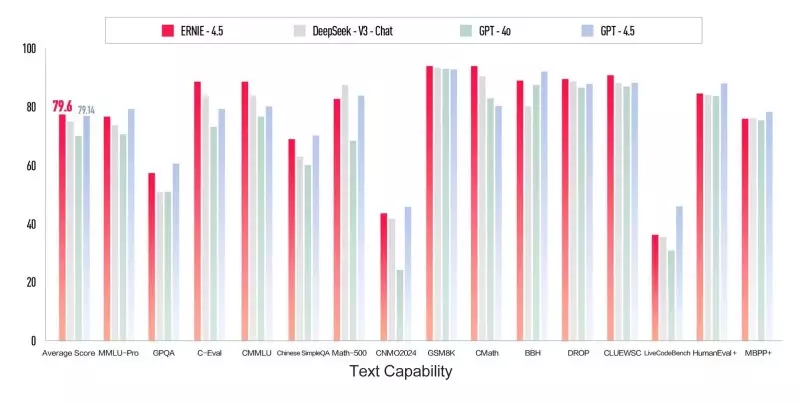In an audacious move that could reshape the landscape of artificial intelligence, Baidu has unfurled two cutting-edge models: ERNIE 4.5 and ERNIE X1. These models, designed to compete at the highest level, promise state-of-the-art performance that surpasses their predecessors from notable competitors such as DeepSeek and OpenAI. As an essential player in the Chinese tech ecosystem, Baidu aims to not only captivate audiences in China but to establish a foothold in the global AI community as well. This article delves deeply into the intricacies of these new AI models, examining their capabilities and limitations, while also offering insights into their potential impacts on various sectors.
Benchmark-Busting Performance
Baidu claims its ERNIE 4.5 and ERNIE X1 models have outstripped their rivals in a slew of benchmark tests, including C-Eval, CMMLU, and GSM8K. By besting models associated with global heavyweights like OpenAI, Baidu stakes its claim as a formidable competitor on the global stage. However, while the numbers may speak volumes, the subtleties behind these metrics reveal a more complex narrative. The distinction in context limits—8,000 tokens for ERNIE compared to the staggering 128,000 for GPT-4.5—poses questions about the utility of these models in real-world applications. This limitation, noted by industry observers, could render the models less effective outside narrowly defined tasks.
Cost-Effectiveness and Accessibility
A striking feature of Baidu’s announcement is the staggering reduction in operational costs associated with its new AI models. Baidu boasts significant savings compared to its contemporaries, offering ERNIE 4.5 at a remarkable 99% lower cost than GPT-4.5. With costs as low as $0.55 for input tokens, this full-frontal assault on pricing could democratize access to advanced AI, making it feasible for smaller organizations and startups to leverage AI without straining their budgets. However, organizations must balance cost-saving benefits with the potential trade-offs in performance and capability.
Innovative Features of ERNIE Models
What sets ERNIE 4.5 and ERNIE X1 apart are their unique features aimed at tackling complex tasks. ERNIE 4.5 is a multimodal model, engineered to interpret text, images, audio, and video alike. This level of integration offers businesses a versatile tool that can fulfill a myriad of tasks from customer support to content creation. In contrast, ERNIE X1 sharply focuses on advanced reasoning capabilities. This model stands out for its nuanced understanding and planning, which makes it suitable for sophisticated applications such as document analysis and AI-driven Q&A.
Baidu’s technological innovations like FlashMask Dynamic Attention Masking and Self-feedback Enhanced Post-Training make these models not only advanced but also robust, promising improvements in logical reasoning and factual accuracy. These capabilities could be pivotal for businesses that rely heavily on data-driven decision-making.
Targeted Utility and Localization
One of the defining aspects of Baidu’s ERNIE models is their orientation towards the Chinese market. With an emphasis on Chinese language understanding, localized data, and culturally relevant knowledge, these models could prove indispensable for companies operating in or with ties to China. The ability of ERNIE models to integrate seamlessly into Baidu’s expansive ecosystem, which includes platforms for search and task management, adds to their allure. Enterprises focused on the Chinese demographic may find these tools more effective than generalized, Western-centric AI models.
Regulatory Considerations and Future Availability
As the conversation around ethical AI grows louder, Baidu’s commitment to making ERNIE 4.5 open-source by June 30, 2025, raises important questions around licensing and regulatory compliance. While this move is undoubtedly a step towards transparency, companies keen on early adoption must navigate a maze of data privacy policies and compliance standards that vary across jurisdictions. Thus, enterprises should act judiciously, ensuring that regulatory requirements are met prior to larger-scale implementation.
The early availability of the ERNIE models via Baidu AI Cloud underscores the importance of the cloud in contemporary AI deployments. By providing API access, Baidu seeks to foster a community of developers and enterprises that can innovate using its technology.
Baidu is forging ahead in the race to enhance AI capabilities while ensuring these advancements are more accessible than ever. Through a combination of competitive pricing, localized understanding, and innovative features, Baidu’s ERNIE models are poised to challenge the status quo in the AI landscape, promising to deliver on both performance and affordability. The future holds immense potential for businesses and developers willing to dive into this new era of artificial intelligence.

